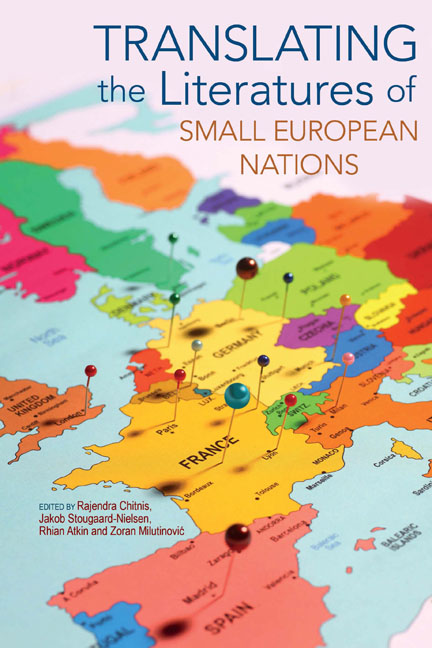Book contents
- Frontmatter
- Contents
- Acknowledgements
- Introduction
- 1 The Global Presentation of Small National Literatures: South Slavs in Literary History and Theory
- 2 Translators as Ambassadors and Gatekeepers: The Case of South Slav Literature
- 3 Supply-driven Translation: Compensating for Lack of Demand
- 4 Literature as Cultural Diplomacy: Czech Literature in Great Britain, 1918–38
- 5 Exporting the Canon: The Mixed Experience of the Dutch Bibliotheca Neerlandica
- 6 Creative Autonomy and Institutional Support in Contemporary Slovene Literature
- 7 Strategies for Success? Evaluating the Rise of Catalan Literature
- 8 Gender, Genre and Nation: Nineteenth-century Swedish Women Writers on Export
- 9 Translating as Re-telling: On the English Proliferation of C.P. Cavafy
- 10 Criminal Peripheries: The Globalization of Scandinavian Crime Fiction and Its Agents
- 11 Literary Translation and Digital Culture: The Transmedial Breakthrough of Poland's The Witcher
- 12 Towards a Multilingual Poetics: Self-translation, Translingualism and Maltese Literature
- 13 Does Size Matter? Questioning Methods for the Study of ‘Small’
- Coda: When Small is Big and Big is Small
- Index
11 - Literary Translation and Digital Culture: The Transmedial Breakthrough of Poland's The Witcher
- Frontmatter
- Contents
- Acknowledgements
- Introduction
- 1 The Global Presentation of Small National Literatures: South Slavs in Literary History and Theory
- 2 Translators as Ambassadors and Gatekeepers: The Case of South Slav Literature
- 3 Supply-driven Translation: Compensating for Lack of Demand
- 4 Literature as Cultural Diplomacy: Czech Literature in Great Britain, 1918–38
- 5 Exporting the Canon: The Mixed Experience of the Dutch Bibliotheca Neerlandica
- 6 Creative Autonomy and Institutional Support in Contemporary Slovene Literature
- 7 Strategies for Success? Evaluating the Rise of Catalan Literature
- 8 Gender, Genre and Nation: Nineteenth-century Swedish Women Writers on Export
- 9 Translating as Re-telling: On the English Proliferation of C.P. Cavafy
- 10 Criminal Peripheries: The Globalization of Scandinavian Crime Fiction and Its Agents
- 11 Literary Translation and Digital Culture: The Transmedial Breakthrough of Poland's The Witcher
- 12 Towards a Multilingual Poetics: Self-translation, Translingualism and Maltese Literature
- 13 Does Size Matter? Questioning Methods for the Study of ‘Small’
- Coda: When Small is Big and Big is Small
- Index
Summary
In June 2015, something unusual happened in the field of small European literatures. The Last Wish (2007), an English translation of a Polish collection of fantasy short stories, appeared among the New York Times’ 15 bestselling mass-market paperbacks in the US. It was the only translated book on the list, which otherwise included Game of Thrones, romance novels and the latest instalments of Clive Cussler (b.1931) and Lee Child (b.1954). Four years earlier, the then Prime Minister of Poland had presented the same book to President Obama during his state visit in Warsaw. If interested, the American president could have read on the cover that he had been given a ‘European superstar, in English for the first time’.
Anyone familiar with contemporary popular culture will recognize the anomaly. Given the absolute dominance of English in this field, especially in the fantastic (Bhabha 1994, 21; Gouanvic, 1997), the ‘aggressive monolingualism’ of anglophone audiences (Venuti 2008, 13), and the normal direction of exchange between English and most other languages in the world, such cases are as rare as unicorns, and equally sensational. How did this book get translated and become a bestseller is such a translation-resistant market? How could something that ostensibly resembles a piece of genre fiction simultaneously hold so much significance for a Central European nation that it becomes its symbol? Can one be a fantasy superstar without speaking English? What does this all mean for smaller literatures?
The answer lies in modern digital cultures. The Last Wish is a part of what we now call a transmedia franchise, known as The Witcher (Wiedźmin in Polish). It consists of a body of short stories and novels published between 1986 and 1999 by the Polish author Andrzej Sapkowski (b.1948), a trilogy of videogames based on them by the Polish studio CD Projekt RED (2007–15) and numerous ancillary texts and products by various creators. The original books are a model of cultural hybridity, a Western fantasy formula saturated with Slav folklore and mythology, which helped them achieve cult status in Poland and fed into their initial popularity across Central and Eastern Europe. It was only after the commercial triumph of the Polish video game, however, that Sapkowski's books became available in English, initially only in fan translations as the traditional publishing industry failed to deliver.
- Type
- Chapter
- Information
- Translating the Literatures of Small European Nations , pp. 205 - 226Publisher: Liverpool University PressPrint publication year: 2019

